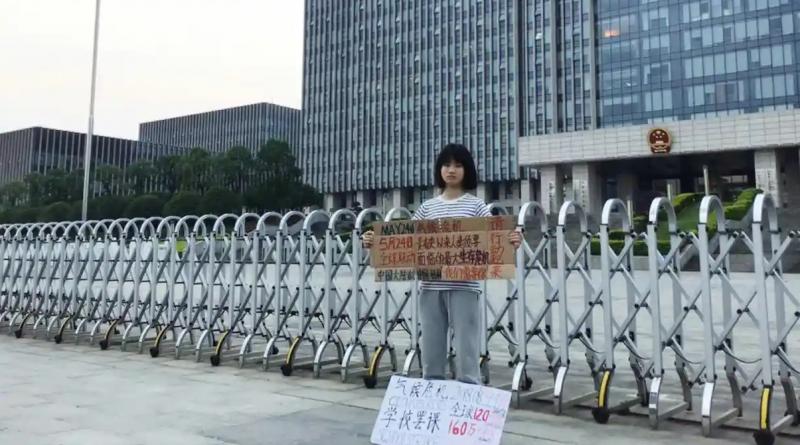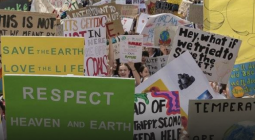China's first climate striker warned: give it up or you can't go back to school

Ou Hongyi, who took part in the #FridaysforFuture protest, says she has been told she cannot return to school unless she stops her activism
Takes initiative. An independent thinker. Engages in study outside of the curriculum. Cares deeply about her community and the world around her. Stands up for her convictions and beliefs.
These are all qualities that would appear to make Ou Hongyi a suitable candidate for studying at her dream institution of Harvard University.
For Ou, however, those qualities may scuttle her chance of even graduating from high school or taking college entrance examinations.
As the first young person in China to engage in Greta Thunberg-inspired Fridays For Future climate strikes, Ou, 17, has become a target for the authorities who see that activism as a challenge to their control.
Ou claims she has been told by authorities to ditch her climate activism as a condition for her restarting studies at Guangxi Normal University affiliated high school in Guilin, where she studied until late 2018.
Ou, who also goes by the English name Howey, suspended her studies in December 2018 after being told she was “not suitable” for the international programme there and decided to study for the Test of English as a Foreign Language (TOEFL) and US college admissions SAT test on her own.
But, following the wishes of her parents, and with dreams of pursuing higher education, she has been attempting in recent months to re-enter the school.
Her parents have been called several times by provincial education authorities, Ou told the Guardian, urging them to stop her climate activism and not to conduct interviews with foreign media.
Ou said her principal, Li Linbo, also told her in a meeting on 29 May that she must promise to end her climate activism before being readmitted, a claim corroborated by her father.
Several attempts to reach her principal, including calls to his office and personal number, as well as faxed questions, were not responded to.
“I don’t want to stop,” Ou said of her climate activism. “I want more people to know.”
Authorities also required Howey to have a psychological test before applying for readmission. “The only negative thing it said was I’m stubborn,” she said.
Ou Jun, her father, told the Guardian that her parents would not force her to give up her beliefs, but added that they were worried about her obsession and how it could derail her future. “She has anxiety about the climate,” he said. “We hope that she can graduate from high school, enter university, and hope that she can pay less attention to climate change issues.”
While currently the top global carbon dioxide emitter, China is expected to meet its Paris Agreement pledge of peaking carbon emissions at or before 2030. China’s leader, Xi Jinping, has also put the development of an “ecological civilisation” at the core of his policies, which would appear to be a natural fit with Ou’s own obsessions.
It is not necessarily her concerns for the climate that have sparked a pressure campaign from authorities, Kecheng Fang, an assistant professor at the school of journalism at the Chinese University of Hong Kong, told the Guardian.
“Most importantly, because it is about collective action,” he said. “No matter what kind of collective action it is, it’s considered highly sensitive.”
While expressing concern about climate change is not forbidden, there has been a narrowing of discourse on the subject, particularly if it calls into question the ambition of authorities, Fang said. “The underlying logic is that basically you can talk about those topics that are considered less sensitive, but it matters how you talk about it.”
While she waits to return to school, Ou has started her own initiative called Plant for Survival, whereby she is encouraging young people in China to plant more trees. From last November through to this January, the group planted more than 300 trees in and around Guilin.
THE Guardian
Photo credit: Ou Hongyi, climate change activist, stands outside the Guilin people’s government in 2019 Photograph: Twitter/ @howey_ou




